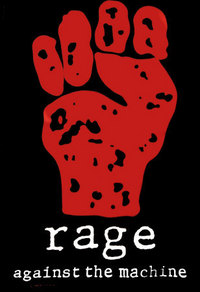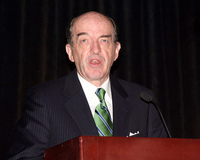
And now you do what they told ya, now you’re under control |
FCC Commissioner Michael Copps, fire-breathing advocate of network neutrality regulation and opponent of media consolidation, has taken a stand on AT&T’s now infamous censorship of Pearl Jam front man Eddie Vedder’s anti-Bush remarks at Lollapalooza. In an interview with OpenLeft.com’s Matt Stoller, Copps supported the idea that there’s a link between AT&T’s deletion of Vedder’s political comments from a webcast of the concert and the network neutrality fight that’s brewing in the halls of Congress.And it’s good that Copps sees the connection between this episode and media consolidation. Copps talks a good talk, but will he do more than “grudgingly accept” this sort of thing, like he did the bogus 700Mhz auction rules? Will he vote against, and will he persuade other commissioners to do the same? And can someone persuade Congress to change the FCC’s tune? It’s all very well to rage against the machine, but who’s going to change it?“Events like this are connected to the larger issue of network neutrality, so it is very very important,” Copps said in response to a question about whether or not AT&T’s censorship of Vedder has any implications for network neutrality. He went on to say, “So when something like the episode occurs with Pearl Jam that you’re referencing that ought to concern all of us… because if you can do it for one group, you can do it to any group and say ‘Well, it’s not intentional,’ and things like that. But nobody should have that power to do that and then be able to exercise distributive control over the distribution and control over the content too.
— FCC Commissioner: Pearl Jam censorship linked to net neutrality fight, By Jon Stokes, ars technica, Published: August 17, 2007 – 01:56PM
Or can we get some Internet access competition? Then we could have Internet freedom.
-jsq







